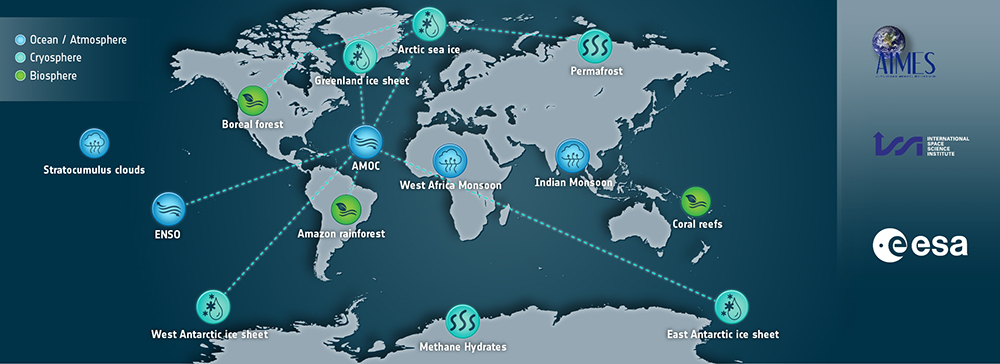Schedule and Zoom Connection details
Tipping points Forum
26-29 January 2021
ISSI in Bern, Switzerland and online
Please join in 15 Minutes earlier to check if connection and screen sharing works.
| DAY 1 – Tuesday 26 January (13:30 UK/14:30 CET) | |
| 14:30 CET
|
Opening and welcome
Welcome and overview of ESA missions for Climate Science – Maurice Borgeaud (Head of Science Applications and Climate Department, ESA) |
| 14:45-16:00 | Session 1: Intro: what are the climate tipping elements, and state-of-the-art for identifying and observing them? Overview of modelling and remote sensing to investigate them to date. To include notions of stability state and resilience over time, and the different timescales of systems being monitored. Introducing a risk framework for the breakouts to use in their discussions.
Chair: Philippe Ciais (LSCE)
Speakers: Tim Lenton (U. Exeter); Victor Brovkin (Max Planck Institute for Meteorology); Alessandra Conversi (CNR-ISMAR Italy); Didier Swingedouw (U. Bordeaux); Ricarda Winkelmann (Potsdam Institute for Climate Impact Research); Q&A |
| 16:00-16:15 | COMFORT BREAK AND MOVE INTO BREAKOUTS |
| 16:15-17:00 | Breakouts by sphere (45 mins):
1) Biosphere – land (lead: Victor Brovkin (Max Planck Institute for Meteorology)) You will be assigned by the host to the breakout group. If you need to change something, write to the host in the chat. The host will also end the groups and let you return to the main session. 2) Ocean-atmosphere and biota (lead: Alessandra Conversi (CNR-ISMAR Italy), Didier Swingedouw (U. Bordeaux) & Gerard McCarthy (Maynooth University, Ireland)) You will be assigned by the host to the breakout group. If you need to change something, write to the host in the chat. The host will also end the groups and let you return to the main session. 3) Cryosphere (lead: Ricarda Winkelmann (Potsdam Institute for Climate Impact Research)) You will be assigned by the host to the breakout group. If you need to change something, write to the host in the chat. The host will also end the groups and let you return to the main session. |
| 17:00-17:20 | Feedback from Breakouts
Chair summaries and closes the day
|
| DAY 2 – Wednesday 27 January (14:00 UK/15:00 CET) | |
| 15:00-15:30 | Session 2: What does society need to know about tipping elements to be able to react? To outline impacts of different tipping elements and mitigation/adaptation policy needs, e.g. irreversible commitments to carbon release, information the finance sector needs around climate risk, city-level adaptation thresholds, indicators and early warning. Aiming for a calibration – translating the science into what’s actionable. Discussing the science-policy interface for policy-relevant science.
Chair: Jakob Zscheischler (U. Bern)
Speakers: Roland Kupers (Institute for Advanced Studies Amsterdam); Liviu Stirbat (Deputy Head of the Adaptation unit, European Commission Directorate General for Climate Action) Meeting ID: 819 1535 9489 |
| 15:30-16:00 | Small breakouts in groups of 4
1) What’s your experience of interacting with policymakers on climate science, and their information needs? 2) What 2-3 points would you seek to make during talks with policymakers about climate tipping points?
|
| 16:00-16:30 | Plenary discussion led by Roland Kupers
Chair summarises key points and closes day |
| DAY 3 – 28 January (13:00 UK/14:00 CET) | |
| 14:00-15:15 | Session 3: What are the latest techniques for improving the detection and quantification of tipping elements in remote sensing data? How and which observations or indicators are being integrated into Earth system models at global and regional modelling advances?
Chair: Jan Verbesselt (U. Wageningen) Speakers: Sebastian Bathiany (Wageningen University); Jonathan Donges (Potsdam Institute for Climate Impact Research); Peter Cox (U. Exeter) Niklas Boers (Potsdam Institute for Climate Impact Research); Q&A |
| 15:15-15:45 | COMFORT BREAK |
| 15:45-17:00 | Session 4: Early warning indicators of tipping elements – what can we learn using remote sensing and advanced processing techniques going forward? What aspects need development over the next, 3-5, 10-15 and beyond timescales? Can we prioritise the recommendations using the risk framework?
Chair: Susanne Mecklenberg (ESA Climate Office) Breakouts by sphere (75 mins). Participants to brainstorm best combination of methods for tipping elements in their domain and ideas for how remote sensing can best inform that. 1) Biosphere (leads: Victor Brovkin (Max Planck Institute for Meteorology), Philippe Ciais (LSCE)) 2) Ocean-atmosphere and biota (lead: Alessandra Conversi (CNR-ISMAR Italy) & Didier Swingedouw (U. Bordeaux)) 3) Cryosphere (lead: Ricarda Winkelmann (Potsdam Institute for Climate Impact Research))
|
| 17:00-17:55 | Feedback from Breakouts and plenary discussion to identify commonalities |
| 17:55-18:00 | Moderator summarises sessions 3 and 4 and closes the day. |
| DAY 4 – Thursday 29 January (9:00 UK/10:00 CET) | |
| 10:00-11:15 | Session 5: Summary of main recommendations and reporting: discussion of ‘perspective’ paper and planning of priority roadmap for space agencies/national monitoring agencies.
Chairs: Ricarda Winkelmann/Tim Lenton. |
| 11:15-11:45 | COMFORT BREAK AND MOVE INTO BREAKOUTS |
| 11:45-12:45 | Working group breakouts by case studies (divisions TBD in plenary)
1. Breakout 2. Breakout 3. Breakout
|
| 12:45-13:15 | Breakout reporting and final plenary discussion for next steps |
| 13:15-13:30 | Wrap-up and evaluation
|
